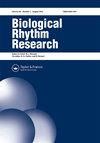Psychological factors and healthy sleep in a Portuguese sample of employees with regular working hours
IF 0.9
4区 生物学
Q3 BIOLOGY
引用次数: 0
Abstract
ABSTRACT The aim of our study was to explore the contribution of psychological factors for healthy sleep within a sample of one hundred employees (M= 43.4 ± 9.91 years; 74% female) with regular working schedules. Participants completed a set of questionnaires about sociodemographic characteristics, lifestyle behaviours, sleep times, healthy sleep, insomnia, sleep hygiene behaviours, personality traits, work-related cognitions, mood and well-being. Descriptive, correlational and multiple linear regression analyses were performed. Extraversion, perception that work effort was properly rewarded, job autonomy, satisfaction with working conditions, vigour-activity, friendship and well-being were positively associated with healthy sleep; arousal predisposition, neuroticism, can't stop thinking of work, rumination, worry, depression-dejection, tension-anxiety, confusion-bewilderment and fatigue-inertia were negatively associated. Multiple linear regression analyses identified four factors that mostly contributed to healthy sleep (41.3%): neuroticism (R2 = .245, p< .001), worry during sleep (R2 change= .094 p= .001), well-being (R2 change= .044, p= .016) and job autonomy (R2 change= .030, p= .041). Employees with lower levels of neuroticism, less worry during the night, better well-being and higher autonomy at work experienced healthier sleep. To promote healthy sleep among employees with regular/daytime working hours it might be important to consider personality traits, work-related cognitions and well-being.葡萄牙正常工作时间雇员的心理因素与健康睡眠
摘要:本研究旨在探讨100名员工(M= 43.4±9.91岁;(74%为女性),工作时间有规律。参与者完成了一套关于社会人口学特征、生活方式行为、睡眠时间、健康睡眠、失眠、睡眠卫生行为、人格特征、与工作有关的认知、情绪和幸福感的调查问卷。进行了描述性、相关性和多元线性回归分析。外向性、工作努力得到适当奖励的感觉、工作自主性、对工作条件的满意度、活力、友谊和幸福感与健康睡眠呈正相关;唤醒倾向,神经质,不能停止思考工作,沉思,担心,抑郁-沮丧,紧张-焦虑,困惑-困惑和疲劳-惯性是负相关的。多元线性回归分析确定了四个因素对健康睡眠的影响最大(41.3%):神经质(R2 = 0.245, p< 0.001)、睡眠焦虑(R2变化= 0.094 p= 0.001)、幸福感(R2变化= 0.044,p= 0.016)和工作自主性(R2变化= 0.030,p= 0.041)。神经质程度较低、夜间忧虑较少、幸福感较好、工作自主性较高的员工睡眠更健康。为了促进有规律/白天工作时间的员工的健康睡眠,考虑人格特质、与工作相关的认知和幸福感可能很重要。
本文章由计算机程序翻译,如有差异,请以英文原文为准。
求助全文
约1分钟内获得全文
求助全文
来源期刊

Biological Rhythm Research
生物-生理学
CiteScore
3.00
自引率
9.10%
发文量
34
审稿时长
6-12 weeks
期刊介绍:
The principal aim of Biological Rhythm Research is to cover any aspect of research into the broad topic of biological rhythms. The area covered can range from studies at the genetic or molecular level to those of behavioural or clinical topics. It can also include ultradian, circadian, infradian or annual rhythms. In this way, the Editorial Board tries to stimulate interdisciplinary rhythm research. Such an aim reflects not only the similarity of the methods used in different fields of chronobiology, but also the fact that many influences that exert controlling or masking effects are common. Amongst the controlling factors, attention is paid to the effects of climate change on living organisms. So, papers dealing with biometeorological aspects can also be submitted.
The Journal publishes original scientific research papers, review papers, short notes on research in progress, book reviews and summaries of activities, symposia and congresses of national and international organizations dealing with rhythmic phenomena.
 求助内容:
求助内容: 应助结果提醒方式:
应助结果提醒方式:


